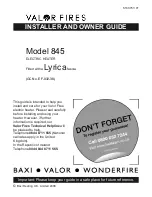
9
Water Supply Connections
IMPORTANT: Do not
apply heat to the HOT or
COLD water connections. If
sweat connections are used,
sweat tubing to adapter
before fitting adapter to the
water connections on
heater. Any heat applied to
the water supply fittings
will permanently damage
the internal components of
the water heater.
Mounting the Water Heater
Make sure the location of the appliance
allows for easy access and operation.
Wall studs should be utilized when
mounting the water heater to the wall.
In case of dry wall or concrete wall use
dry wall anchors or lag bolts.
The water heater requires 120VAC/60Hz.
Have a receptacle with ground terminal
near the water heater. The length of the
power supply cord is 10 feet.
Install a wood screw for the upper bracket
with a clearance of 1/8” between the wall
and the screw head. Hang the center of the
upper bracket on the screw.
Using a wood screw and a washer, affix
the lower bracket to the wall (Left and
Right). Repeat to affix the top bracket.
The brackets can be adjusted to change
the distance between the back of the
appliance and the wall within the range of
3/8” to 1½”.
Loosen the adjustment screws of both the
top and the bottom brackets to adjust the
distance. (See diagram below)
Bracket
Bracket
Adjustment Screws
Adjustment Screws
TOP
BOTTOM
Upper Bracket
Wood Screw
Washer
Wood Screw
Washer
Washer
Wood Screw
Lower Bracket
1/8"
Clearance
Plumbing should be carried out by a
qualified plumber in accordance with local
codes.
Use approved plumbing materials only.
All material between the water supply and
the water heater must be metal.
The diameter of the pipe lines should be a
minimum of 3/4”.
To conserve energy and to prevent
freezing, insulate both cold and hot water
supply lines. DO NOT cover the drain
valves.
To ensure proper operation of the water
heater, the following water pressure
guidelines should be followed:
●
Operation of the water heater requires
the minimum water pressure of 14 psi
and a minimum water flow rate of
0.66 gpm.
●
Additional water pressure is required
for long pipe runs and outlet fitting(s)
water pressure drops.
●
To maintain proper performance, ensure
sufficient water supply pressure. The
Required Water Pressure = Min.
Operating Water Pressure (14 psi) +
Pipe Pressure Loss + Faucet and
Shower Pressure Loss + Safety Margin
(more than 5 psi).
●
To supply hot water to upper floors,
additional water pressure (0.44 psi/ft)
must be ensured. The measurement
should be calculated by the distance
between the water inlet of the water
heater (ground level) to the hot water
faucet (upper floor level).
●
Well water systems should be set at a
range of 50-60 psi.
●
When the water is supplied from a
water supply tank, the height of the
tank and the diameter of the pipes and
their relation to water pressure, should
be taken into consideration.
Gravity
water pressure is not recommended
.
Notice:
If the water flow resistance of a
shower head is too high, the burner in the
water heater will fail to ignite. Keep the
shower head clean from debris that could
cause additional pressure drop.
Notice:
If using mixing valves on the
outlet, choose one which prevents cold
water pressure from overcoming hot water
line pressure.
CAUTION: This water
heater must only be used
with the following water
supply system conditions:
●
With clean, potable water
free of corrosive
chemicals, sand, dirt, or
other contaminates.
●
With inlet water
temperatures above 32°F,
but not exceeding 120°F.
●
Free of lime and scale
deposits.
●
DO NOT reverse the hot
and cold water
connections. The water
heater will not operate.
!
CAUTION:
Reinforcement of the wall is
required in case the wall is
not strong enough to hold
the appliance.
!










































